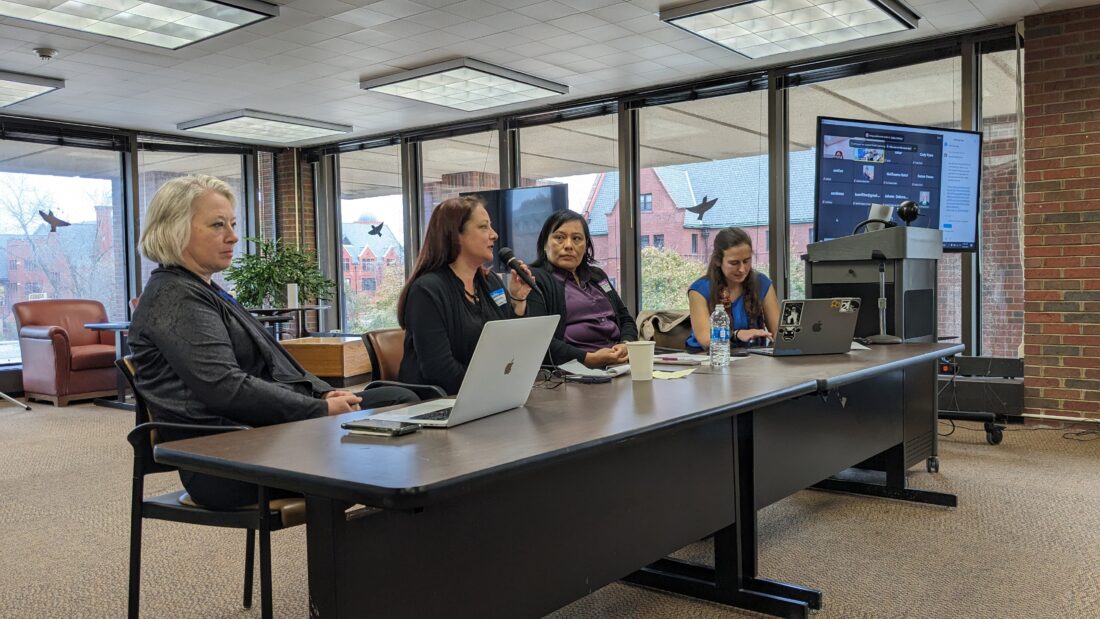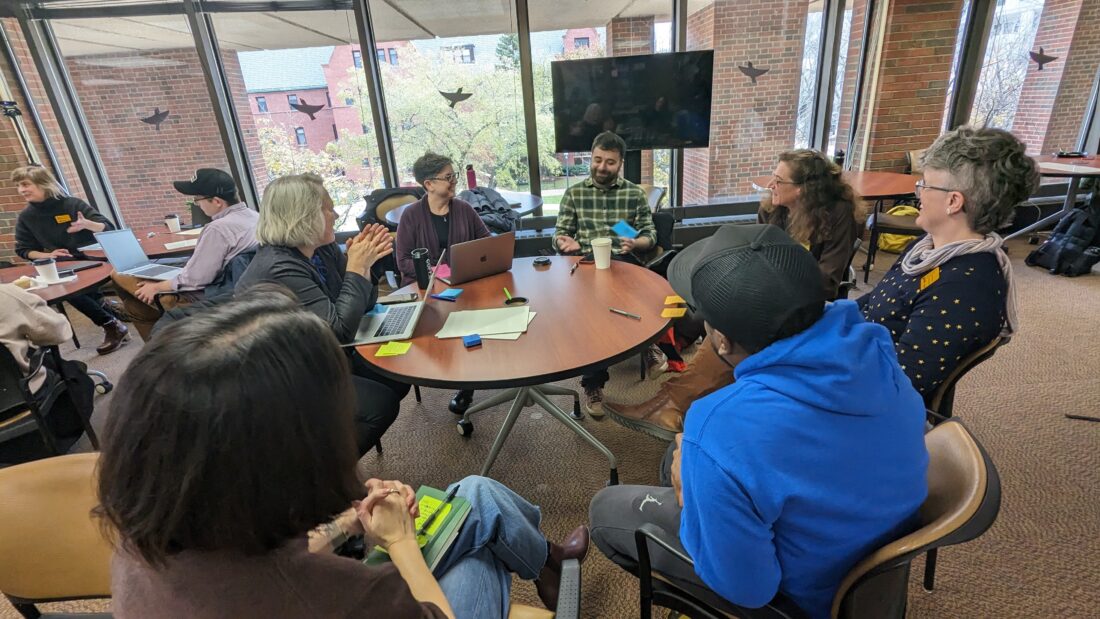On November 2 and 3, 2023, the Center for 21st Century Studies (C21) in association with UWM Libraries hosted a series of conversations exploring the shifting landscape of humanities publishing across the interconnected perspectives of humanities centers, university presses, and libraries. Thanks to support from CHCI’s Membership Activity Fund, we brought together a group of speakers who are each reshaping their roles in the process of knowledge creation and dissemination, while acknowledging how digital and interactive formats, diverse perspectives, community engagement, and open accessibility continue to change what and where humanities scholars publish.
The workshop opened with a lecture by Kathleen Fitzpatrick (Director of Digital Humanities and Professor of English, Director of MESH, and Director of Humanities Commons at Michigan State University) on “Building a More Generous University: Collaboration, Community, Solidarity.” Fitzpatrick calls for a radical approach with deep structural changes within university systems towards new kinds of solidarities that support public trust and engagement in the name of public good, and that build bridges to encourage collaborations between scholars, university leaders, administration, and community members. Fitzpatrick asks us to recognize who can make changes to shift us from individualism towards community building and where that change can occur, so that others can multiply these structures of connection across all levels of the university.

The next day, a roundtable on “Mapping Current and Future Roles in Humanities Publishing Projects” featured Lauren Cooper (Digital Scholarship Librarian and Managing Director, Center for Black Digital Research/#DigBlk, Penn State University), Lisa Janicke Hinchliffe (Professor & Coordinator for Research and Teaching Professional Development, University of Illinois), and Jasmine Mulliken (Production and Preservation Manager, Digital Projects Stanford University Press). Janicke Hinchliffe asked us to think about what infrastructures need to be in place for libraries to support and sustain open access digital humanities projects and noted that making things open is only the first step in making them discoverable. Speaking about digitally-archived community-engaged projects, Cooper urged us to remember the hearts and minds behind those projects – the people who told their stories and the real lives lived, as well as the labor, time, and energy required to be a community advocate and archivist. For Mulliken, a key point in digital publishing is the collaboration that occurs across a multitude of experts beyond any one author, but that kind of collaboration unfolds over a longer duration and requires a different framework for support. This is an especially pressing concern because Stanford University Press’s Digital Projects is about to reach the end of their Mellon Foundation funding. For Janicke Hinchliffe, this makes it even more necessary to articulate a narrative of importance in the humanities that clearly articulates and makes transparent processes like peer review so we can open more gathering spaces for scholars to support each other.

After a final brainstorming workshop on future actionable steps facilitated by outgoing C21 deputy director Nicole Welk-Joerger, there were so many takeaways. For the past two years, C21 has been reimagining what an interdisciplinary humanities center is and what it can do, while supporting humanities scholars alongside local community experts. This rethinking has included changing the center’s publication framework after a long history of publishing edited volumes that arose from annual themed conferences. As we gather scholars and experts both in academia and in our communities to respond to issues and events in real-time (from loneliness and isolation, to food access, to trust and the vote), we present those ideas-in-progress in both print and digital spaces, and across visual, audio, video, and other media with an eye towards open access scholarship. C21 is demonstrating how knowledge production is horizontal, with concepts, systems, and embodied experiences cross-pollinating each other across disciplines, histories, and lived experiences, while connecting multiple viewpoints over a longer timeframe.
This multi-sided, open-ended conversational framework is a foundational to our programming at C21, as reflected in our 6.5 Mins With…podcasts, interactive book club, participatory research projects, and exhibitions – and it is also how we are approaching the future of humanities publishing and rethinking our relationship with the university press. Listening to our colleagues reminded us that we need to make our horizontal platform clearer on our website and through our communications, to show how we are building connections and providing support for collaborations, oftentimes behind the scenes, and to demonstrate our process of ongoing peer review at multiple levels by and for our project participants and through our advisory council of both faculty and community partners. As we explore ways to share and publish ideas while withstanding new pressures in humanities publishing, C21 is working to transform, slowly but determinedly, our reimagination into action.